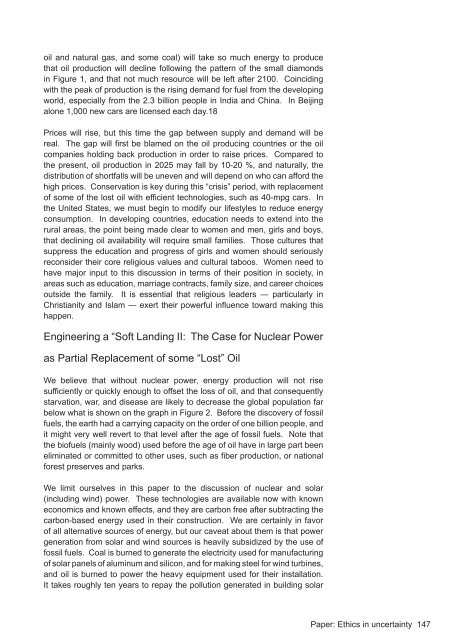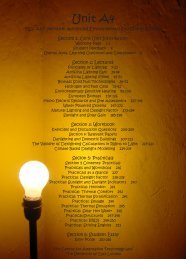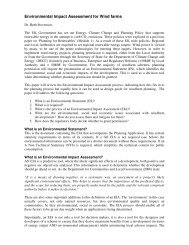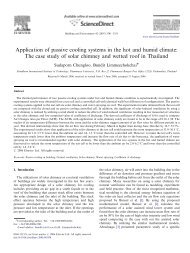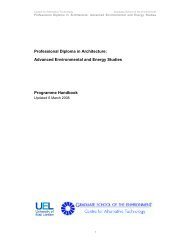Module B1 Study Book - the Graduate School of the Environment
Module B1 Study Book - the Graduate School of the Environment
Module B1 Study Book - the Graduate School of the Environment
You also want an ePaper? Increase the reach of your titles
YUMPU automatically turns print PDFs into web optimized ePapers that Google loves.
oil and natural gas, and some coal) will take so much energy to produce<br />
that oil production will decline following <strong>the</strong> pattern <strong>of</strong> <strong>the</strong> small diamonds<br />
in Figure 1, and that not much resource will be left after 2100. Coinciding<br />
with <strong>the</strong> peak <strong>of</strong> production is <strong>the</strong> rising demand for fuel from <strong>the</strong> developing<br />
world, especially from <strong>the</strong> 2.3 billion people in India and China. In Beijing<br />
alone 1,000 new cars are licensed each day.18<br />
Prices will rise, but this time <strong>the</strong> gap between supply and demand will be<br />
real. The gap will first be blamed on <strong>the</strong> oil producing countries or <strong>the</strong> oil<br />
companies holding back production in order to raise prices. Compared to<br />
<strong>the</strong> present, oil production in 2025 may fall by 10-20 %, and naturally, <strong>the</strong><br />
distribution <strong>of</strong> shortfalls will be uneven and will depend on who can afford <strong>the</strong><br />
high prices. Conservation is key during this “crisis” period, with replacement<br />
<strong>of</strong> some <strong>of</strong> <strong>the</strong> lost oil with efficient technologies, such as 40-mpg cars. In<br />
<strong>the</strong> United States, we must begin to modify our lifestyles to reduce energy<br />
consumption. In developing countries, education needs to extend into <strong>the</strong><br />
rural areas, <strong>the</strong> point being made clear to women and men, girls and boys,<br />
that declining oil availability will require small families. Those cultures that<br />
suppress <strong>the</strong> education and progress <strong>of</strong> girls and women should seriously<br />
reconsider <strong>the</strong>ir core religious values and cultural taboos. Women need to<br />
have major input to this discussion in terms <strong>of</strong> <strong>the</strong>ir position in society, in<br />
areas such as education, marriage contracts, family size, and career choices<br />
outside <strong>the</strong> family. It is essential that religious leaders ― particularly in<br />
Christianity and Islam ― exert <strong>the</strong>ir powerful influence toward making this<br />
happen.<br />
Engineering a “S<strong>of</strong>t Landing II: The Case for Nuclear Power<br />
as Partial Replacement <strong>of</strong> some “Lost” Oil<br />
We believe that without nuclear power, energy production will not rise<br />
sufficiently or quickly enough to <strong>of</strong>fset <strong>the</strong> loss <strong>of</strong> oil, and that consequently<br />
starvation, war, and disease are likely to decrease <strong>the</strong> global population far<br />
below what is shown on <strong>the</strong> graph in Figure 2. Before <strong>the</strong> discovery <strong>of</strong> fossil<br />
fuels, <strong>the</strong> earth had a carrying capacity on <strong>the</strong> order <strong>of</strong> one billion people, and<br />
it might very well revert to that level after <strong>the</strong> age <strong>of</strong> fossil fuels. Note that<br />
<strong>the</strong> bi<strong>of</strong>uels (mainly wood) used before <strong>the</strong> age <strong>of</strong> oil have in large part been<br />
eliminated or committed to o<strong>the</strong>r uses, such as fiber production, or national<br />
forest preserves and parks.<br />
We limit ourselves in this paper to <strong>the</strong> discussion <strong>of</strong> nuclear and solar<br />
(including wind) power. These technologies are available now with known<br />
economics and known effects, and <strong>the</strong>y are carbon free after subtracting <strong>the</strong><br />
carbon-based energy used in <strong>the</strong>ir construction. We are certainly in favor<br />
<strong>of</strong> all alternative sources <strong>of</strong> energy, but our caveat about <strong>the</strong>m is that power<br />
generation from solar and wind sources is heavily subsidized by <strong>the</strong> use <strong>of</strong><br />
fossil fuels. Coal is burned to generate <strong>the</strong> electricity used for manufacturing<br />
<strong>of</strong> solar panels <strong>of</strong> aluminum and silicon, and for making steel for wind turbines,<br />
and oil is burned to power <strong>the</strong> heavy equipment used for <strong>the</strong>ir installation.<br />
It takes roughly ten years to repay <strong>the</strong> pollution generated in building solar<br />
Paper: Ethics in uncertainty 147


